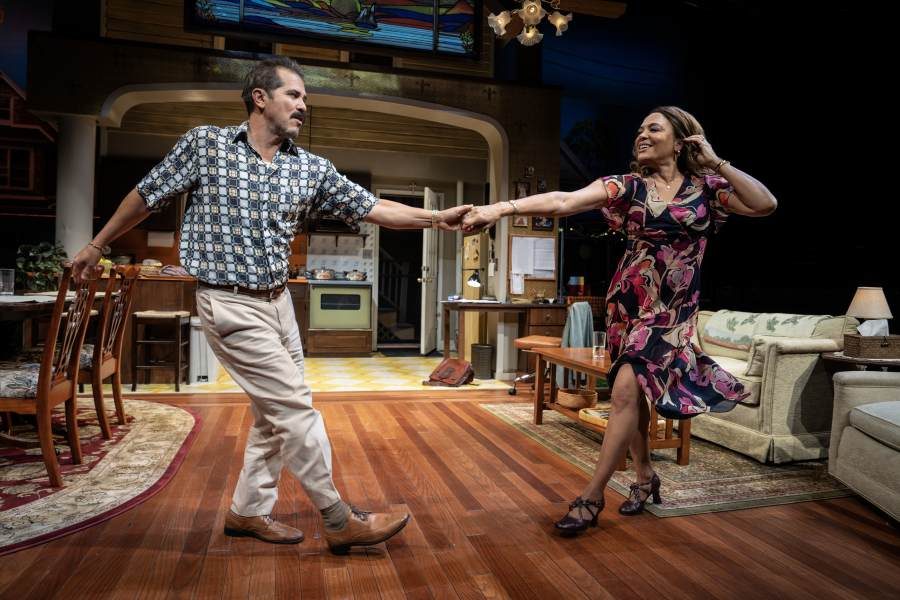

Hispanics comprise about 20.0% of the total U.S. making up the largest ethnic minority in the US. Yet, in the new drama “The Other Americans” written by John Leguizamo playing at The Public Theater, they still feel they don’t belong.
Leguizamo, known for his sharp funny insightful one-man shows, stars as Nelson, owner of several laundromats. Set in the 1990s, from the perspective of Colombian-Americans, Nelson seeks to achieve the American Dream. He’s proud of having moved his family from Jackson Heights, Queens to Forest Hills when Forest Hills was predominantly white. The move was not without fallout for his family as they feel subtle racial prejudice.
His wife Patti, ( terrific Luna Lauren Velez) misses her friends and the comfort of the old neighborhood and his son Nicky (played by Trey Santiago-Hudson, son of the director Ruben Santiago-Hudson)) is the victim of a vicious assault by white classmates in high school.
Nelson is a hustler, always trying to make a deal. He’s a bit boisterous, constantly moving, singing and dancing. When the play opens, Nelson is struggling financially, though he doesn’t tell his family. Instead they think he has an offer from a real estate mogul to buy out his laundromats. His wife tries to convince him to take the deal and move back to the ‘neighborhood.’ Instead he attempts to secure a loan from his sister.
The family, including older daughter Toni (Rebecca Jimenez) and her fiancee (Eddie (Bradley James Tejada,) is anxiously anticipating the return of Nicky from a mental sanatorium. He had a breakdown at college as a delayed result of the assault and what adds to his anxiety was that the charges were inexplicably dropped.
Once home, Nicky optimistically shares his plans for the future including moving out and becoming a choreographer instead of taking over his father’s laundromats. However, his parents quickly object. Nicky is only home for a few hours before he becomes anxious, grows overwrought and storms out. (He does that several times during the play.) Leguizamo doesn’t give Nicky much to do and each scene with him feels the same. Trey Santiago-Hudson is weak as the one-note character. He blows up quickly and spends much of his stage time dashing off.
Nicky wants to discuss what happened to him. Although Patti listens, Nelson refuses to. He shows his love for his son through tangible things and proudly shows Nicky the above- ground pool he bought him.
Leguizamo is good at bringing Nelson to life but he didn't create a character we care about. He’s a schemer, self-absorbed, full of bluster and false confidence. He’s also quick to blame and find excuses. He claims that his failures are because his father didn't love him and gave his sister Norma (worldly Rosa Evangelina Arredondo) the good ‘mats’ and him the ones in the hood. Nelson feels he can’t get a loan because of his ethnicity, claiming it’s “cause my name is Castro and not MacMann,” But his sister doesn’t let him off that easily.
Although the title implies bias and prejudice, it is subtle and Norma suggests that much of what has happened to the family is due to Nelson and his misguided inflated goals and dreams.
The play goes on too long and the playwright could have consolidated a couple of characters.The play is written in English with a lot of Spanish sprinkled throughout which adds to the naturalism. The story is easy enough to understand whether or not you speak the language.
“The Other Americans” bears similarities to Arthur Miller’s classic work “Death of a Salesman.” However, Miller’s Willie Loman is pitiable because even though he doesn’t get it, he tries. Here we don’t feel for the main character. By the end, Nelson is depressed and for a few moments shows extreme sorrow and remorse. Then he goes back into action on his phone trying to make a deal.
Leguizamo gives a fine performance and commands the whole stage which pleased his many fans at the Public Theater. Yet the play is unsatisfying and much of the story is predictable. Is this about discrimination, manliness or reaching for the American dream Or all three?
THE PUBLIC THEATER
425 Lafayette Street
(At Astor Place)
New York, NY 10003